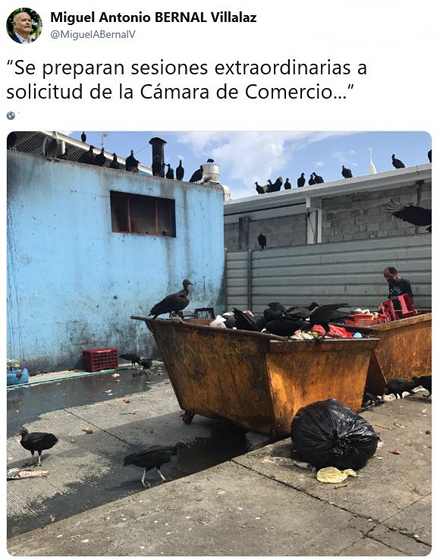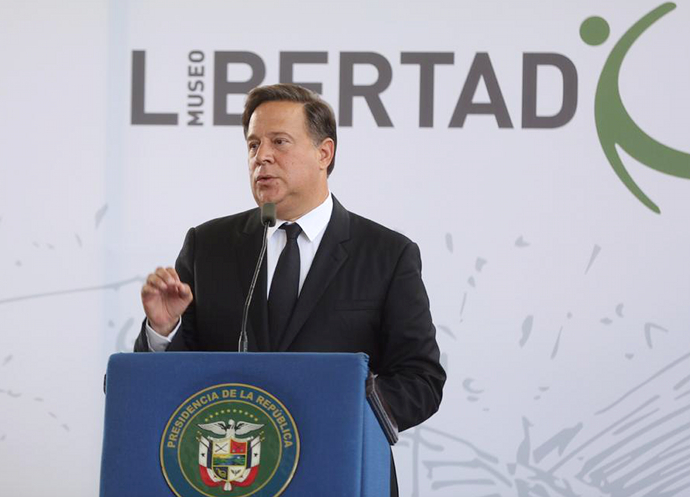“The Constitution belongs to the Panamanian people. It does not belong to a party or to an elected president or to an outgoing president. The constitutional debate belongs to four million Panamanians.” Photo by the Presidencia of Varela at the May 21 dedication of the Museum of Freedom and Democracy. His statements on the constitution came later that day at an appearance with President-Elect Cortizo at the C5 National Security Center.
Varela rebukes Chamber of Commerce, rejects call for special legislative session
by Eric Jackson
The elite business groups’ move to make undisclosed amendments to Panama’s constitution seems to have failed. The plan was to get the current National Assembly and then the incoming one after its July 1 inauguration to pass the Chamber or Commerce (CCIAP) and National Private Enterprise Council’s (CoNEP’s) reported but never published 27 pages of constitutional changes.
The regular sessions of the current legislature ended on April 30 and for a special session to take up the matter, there would have to be a presidential call for this. Starting on Monday, May 27 the assembly will be called into special session for about a dozen different things — lame duck appointments, ratification of what was an illegal contract that after changes of hands is now the basis for the huge copper project in Donoso and so on.
However, President Juan Carlos Varela, in remarks during a May 21 visit with President-Elect Nito Cortizo and incoming National Security Minister Rolando Mirones to the C5 National Security Center, that he would not put constitutional changes on the agenda.
Under Panama’s constitution a special legislative session may only consider things put on its agenda by the president. The business groups’ plan is thus dead.
Varela, whose family owns and runs Panama’s biggest liquor distilling business, has had strained relations with the Chamber of Commerce in particular for some time. You won’t find in his statements any acknowledgement that the Chamber represents “business” in general. (It doesn’t — where are the Chinese merchants, or the informal micro-businesses, or the nonwhite majority of business owners in the photos of Chamber of Commerce events?) And in rejecting the Chamber’s demand, Varela took a scolding tone telling Chamber of Commerce president Jorge Juan de la Guardia to:
Focus on economic issues and specific issues of economic reactivation. On issues of state policy, I think it is important to be led by the whole society, together with the authorities.
Varela’s own proposal to put the subject of convening a constitutional convention on the May 5 ballot was killed by a legislative committee, at the urging of the CCIAP and CoNEP. There was no political debt to be repaid, unless one wants to look at Varela’s position as payback.
Cortizo supported the CCIAP and CoNEP process and he will be the next president, but he comes in having won but one-third of the popular vote. Without the previous legislature giving the new one a proposal to ratify, any constitutional process would have to start anew. Historically, that’s a problem for presidents, an opportunity for people and parties that don’t get along with one another on other matters to join forces to vote against whatever the president with only a plurality mandate proposes. The president who loses a vote like that tends to become a lame duck, although in Cortizo’s case he would probably maintain a working legislative majority.
Call Varela what people may, a fake populist or a real one, just another oligarch or a different sort of one, a pathetic failure or a man of principle, he was systemic and categorical in his rejection of constitutional change by stealth, but an unelected group who have only wealth and surnames as their credentials. Beyond the warning that the public business is not to be privatized by relatively small groups, Varela also made the pragmatic argument about the two legislature approach to changing the constitution at this time:
I have ruled out that possibility. I feel that the constitutional issue deserves a much broader debate than doing something in 40 days. That would not be the right thing for the Panamanian people, who always hope for a new constitution and the improvement of the political system so as to improve their quality of life.
Back to the drawing board? Likely nobody is going to listen to the CCIAP or CoNEP about things constitutional for at least a little while. Cortizo has some political calculations, which he might offload onto someone else by along with the legislature calling for a constitutional convention and leaving it and its work to those delegates that may be elected and to the voters. He might take the risk of submitting particular changes to the voters in a referendum.
Then there are the usual dissidents and independents, now organizing as the Citizens United for a Constituent Assembly (CUCO) and contemplating a petition drive to force the question to the referendum.
The ultimate checks, balances and dangers are that if there is such a convention, whether originating as in the delegates taking charge of all government branches or parallel as in the delegates drafting what they will and perhaps having to put up with the president, legislature or courts interfering with their work, is that if the voters don’t like the end product they can vote “no” and end the process.

CUCO leader Miguel Antonio Bernal’s take on the situation.
These links are interactive — click on the boxes













